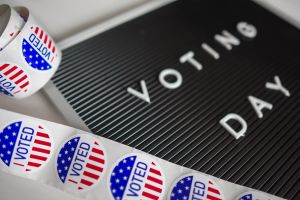
We’re about to see history being made in the 2020 election. The highly anticipated election is expected to be a historic and groundbreaking milestone in American history. Recent polls show Americans are losing faith in Donald Trump because of the way he has been handling the pandemic, but Americans are also weary of voting for Joe Biden after news broke of a sexual assault scandal.
Politics are an extremely integral part of our society, yet so many young people are uniformed about what goes on around them, how it affects them or why their vote even matters in an election. According to John Holbein, assistant professor of public policy and education at University of Virginia, the United States has one of the lowest 18-29 voter turn outs in the world. 90 percent in that age group express some interest in politics and 80 precent plan to vote, but when election day rolls around only 43 percent actually vote. Holbein found through research the reason this number is so low is because young voters “too often fail to follow through on their political interests and intentions.”
So far it seems like the 2020 election will have a record low turn out for young voters. All over the web young people are still posting about Bernie Sanders and how he should be the Democratic pick for president and not Joe Biden. Some are going as far as announcing they will still be voting for him because he is still on the ballot for the remaining states during the primaries, but the real reason he isn’t the pick is because the young people didn’t show up for him. Biden has been having a hard time picking up young voters in general.
Is Cabrini University different?
The National Study of Learning, Voting, and Engagement by the Institute for Democracy and Higher Education at Tufts University published findings about the 2012 presidential election. 72 percent of the Cabrini student body of age to vote had registered and 55.1 percent of those students voted. Cabrini’s results proved to be higher than the national average for college-age voters. It is reported during the 2012 election the national average was 45.1 percent and 48.3 percent in 2016. It is also worth mentioning college-age women voted in higher numbers than their male counterparts. African American college-age voter turn out went down by five percent.
Part of the reason Cabrini’s voter turn out might be higher than the national average is because there are a lot of great resources on campus such as the Wolfington Center. The Wolfington Center helps students register to vote, offers civic engagement workshops throughout the semester, aids students in making a difference in their communities and holds student run panels about advocacy and politics. This can help not only students already interested in politics, but can be extremely beneficial to students unsure of the best way to digest all the information being thrown at them both online and on the television.
How can students get involved?
Daisy Rodriguez, a senior political science major, is the chair of Cabrini Advocates, president of Food Recovery Network, president of Black Student Union, and a member of the Catholic Relief Services. The main goal of Cabrini Advocates is to help with voter turn out and determining how the census can change funding within neighborhoods and how many delegates are given to each state. There had been plans to do voter drives last month to register more students to vote in the primaries. Students can get involved in a number of ways both on and off campus.
“Anyone can get politically involved on campus by encouraging their friends and family members to get informed about the election process and the candidates. You can write a letter or make phone calls to state and federal representatives to support an act or bill,”Rodriguez said. “You can also go lobbying for a certain policy you are passionate about. People in Congress both local and federal are here to work for our best interest; however, it is our job to make sure they know what it is that we as voters and citizens want them to do.”

The best way to get involved from home
Just because every part of our normal existence has been digitalized for the foreseeable future because of COVID-19 does not mean we shouldn’t still get politically involved. According to Abby Kiesa, director of Impact at CIRCLE at Tufts University, people can still register to vote from the safety of their home, make sure you have someone or something you trust to receive information about candidates such as social media, friends, and family, start watching the local news and developing a relationship of trust with it and listen closely to what each candidate says about the issues important to you and those around you such as health care, racial justice, and now the economy.


